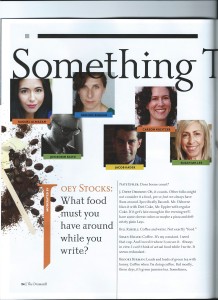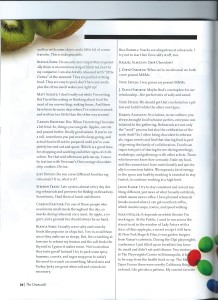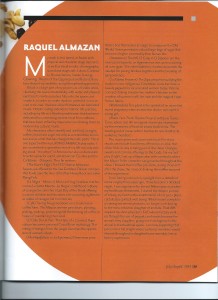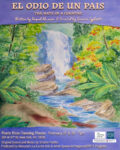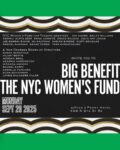Featured in The Dramatist Magazine on the topic of how Almazan uses food as a cultural
Ritual in philosophy and play building. July/August Issue 2014
Raquel Almazan
- What food must you have around while you write? “Dark Chocolate!”
- Do you crave different food during rehearsals? If so, what is it?
“Dark Chocolate! Lol… As a Latina, in our culture, you always brought food to house parties, everyone contributed to the gathering. Rehearsals are not only the “work” process but the celebration of the work itself! So I often bring chocolate to rehearsals, vegan sweets and find that sharing food is part of growing the family of collaborators. Food is an important part of sharing for me during meetings, workshops, and gatherings with other artists. Those who know me, know how seriously I take my food, and the connection I have nutritionally and spiritually to conscious habits. We expend a lot of energy in the space and healthy snacking is essential to stay fueled, to continue working at a high level.”
- How has food – growing/cultivating, preparation, eating, and/or ritual – figured into the work you’ve created?
“My work is text based, in fusion with physical and ritualistic stage elements as well as visual-media, choreography, sound and stagecraft. Laban, Grotowski, Biomechanics, Suzuki Training, Clowning, Theatre of the Oppressed and Butoh Dance have shaped my aesthetic and philosophical approaches.
Ritual is a large part of my process as a theatre artist, cleansing the space ritualistically with water and physical exercises to invite ourselves fully into the space, not invade it, in order to create dynamic potential in our sacred work area. I believe all performances are extended rituals. Holistic eating extends to holistic life practice, including my life as a theatre practitioner: that has been dedicated to connecting ancient ritual from cultures that have been stifled by imperialism and linking them to modern day cultural rituals.
My characters often identify and use food, oranges, coffee, bread and sugar not only as a connection to culture but as a link that has changed their life paths. This is one aspect within my LATIN IS AMERICA play cycle: I am committed to spend the rest of my life not only writing about “the other” in America but also in dedication to write a play for each Latin American Country and the Caribbean – Diaspora. Thus far written:
(The River’s Edge) The 1937 Haitian Massacre. Sweets are offered to the Sea Goddess Olokun in hopes that it will save the lives of brother Heavy Rock and sister Flying Fish.
(La Negra – Mexico) Mexican Drug Goddess that becomes La Santa Muerte .La Negra’s childhood robbery of oranges become her ritual Day of the Dead offering to street children and becomes a re-occurring nightmare as crates of oranges fall from the sky
(Café) Tracing five generations on a Guatemalan coffee farm. The Maquin women pass down, planting, picking, soaking, processing and the brewing of coffee in hopes of maintaining their land.
(El Odio De Un Pais- The Hate of a Country) Rape culture becomes personal Costa Rican mythology. The eating of mangos from the jungle becomes the oppression of women’s flesh.
(The Hopefulness or La Esperanza) Dominican prostitutes box themselves as cargo to conqueror the Old World. Sister prostitutes unload large bags of sugar that become a higher commodity than human life.
(Azamemno) The MS-13 Gang in El Salvador are the new Lenca legends, an Agamemnon war cycle occurring all over again .The cakes baked my mothers becomes the catalyst for joining families together and the breaking of gang violence.
(La Paloma Prisoner) The Zipa people beautifying the body to honor indigenous Colombian Gods becomes a beauty pageant for incarcerated women today. Paloma connects baking bread in her mother’s kitchen to the creation of women itself, her rape and the magical hope for her future.
(Watermelon) This plant is the symbol of an unwanted incest pregnancy when an abortion doctor cuts open a young girl.
(Aliens Taco Truck Theatre Project) with Jose Torres Tama, where real life immigrant stories are interwoven via the memories of food on a taco truck menu. The handing out of social reform burritos to non-traditional audience members.
The ritual opens and closes with food. Pre-show rituals can include food items offered on an altar, that often finds its way in being part of the show. Oranges, sweets and corn are offerings to the Gods. For my last play (Café), I set up a Mayan altar with cornhusks where the Mayan Teller character was grounded throughout the show. I brewed fresh coffee pre-show, during show and after the show, the ritual of drinking the coffee was part of the experience.
Since having restored my eyesight from a detached retina surgery three years ago, I have become a devoted vegan. I was vegetarian for almost fifteen years but when my health was threatened, I started the deeper journey of linking my food to the maintenance of not just a physical but also spiritual well being. Which meant completely cutting out animal products, no longer contributing to the mass industrial slaughter of animals. That shift inspired my short play (Let’s Eat!) where factory workers through the use of puppets and masks become the animals they slaughter, giving voice and agency to the animal in the theatrical space. I am now expanding that piece into a full length where audience members would interact throughout a slaughterhouse assembly line as factory supervisors.”
- Food and theatre have been inextricably linked at least since the ancient Greek festival Dionysia. While the rituals might have changed, why do you think food remains part of the tradition and even a source of inspiration for theatre?
“Again, I think of the word, celebration when it comes to the ritual of performance. That many theatre traditions globally started with harvest rituals, that were part dance, part farming and prayer. The harvesting of food and it’s cycles were integral to the origins of theatre. The more we have moved away from that, the more removed we are from the purpose of theatre, communal space, and what we are grateful for. Theatre festivals would last hours, days and weeks on end so the food and wine aspect of sharing at theatre has changed because of modern theatre structures. We are no longer in the open Agora space, we are in closed in buildings where people don’t interact during the process as much. We all still crave that at shows, to drink and eat during our experience, moving away from a sterile consumption of the mass, “get em’ in and out” audiences. The moment we start to eat, we start to contemplate and share thoughts, it becomes an arena for discourse.
Food is such an essential part of life, I was greatly inspired by the renowned Spanish chef Ferran Adria and his philosophy. He spent 6 months creating a new menu each year and then the next 6 months serving his creations at his restaurant. This is a great model to follow as a theatre creator as well. He contemplates that food is the only element that engages all the senses: sight, hearing, taste, smell and touch. That food has the ability to extend into the next sense: the metaphysical, that food experiences link to our memories and life rituals, birthdays, funerals, religious rites. Ferran tries to capture not just the taste of an olive but the essence of an olive, almost down to it’s molecules. So he will spend months scientifically breaking down the components of an olive. This is what we do as theatre artists as well, we work in metaphors, tirelessly working to capture beyond the literal experience, we examine, tear away, break down components. In Butoh you dance not to just be like a flower, but to capture it’s essence. As a playwright we start each play from that place in hopes to capture the essence of states of being in human experience that are often unquantifiable. We seek to use all of our senses in this constant attempt at the impossible.”
- Do you have any pre or post-show dining rituals?
“As a writer/ performer, I stay away from heavy foods at least 3 to 4 hours before a show. The instrument body needs to be prepared for great action, even as a writer, there to support your cast and crew at a show. Post show dining of breaking bread with audience members and collaborators is still essential. If we did this more often, talk backs would be real gatherings and an opportunity to recognize each other differently, that we are building pieces together. It would set upon a dynamic of sharing and break hierarchy. Serving coffee at my CAFÉ play talk back with a company rep from Think Coffee made a big difference in the audience’s engagement.”

